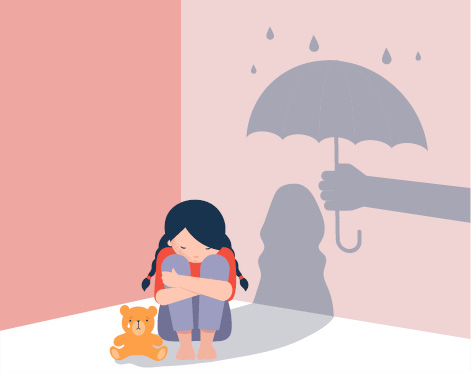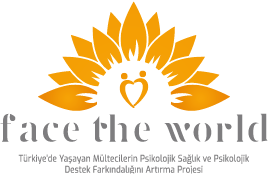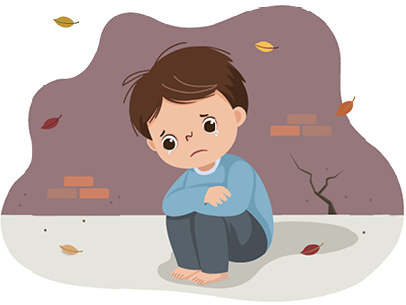- Loneliness and the absence of daily activities that are meaningful and enjoyable can be causes of depression in many asylum seeker children affected by wars and conflicts.
- Depression is more common among children who are under stress and who experience loss and death.
As opposed to the popular belief, depression is a problem that can be experienced by children as well. Do seek help from a child mental health professional without wasting any time so that your child’s life is not further adversely affected!
- The common signs and symptoms observed in childhood depression include:
- S/he frequently expresses the feeling of sadness and cries a lot.
- There may be changes in his/her weight. S/he gains or loses a large amount of weight in a short time.
- S/he may occasionally have physical symptoms, such as headaches and stomach aches.
- S/he experiences trouble paying attention and lacks motivation. Decline in grades for an unknown reason is one of the signs to watch out for.
- S/he may refuse to go to school, have a decline in her/his grades and display nonadoptive behaviour at school.
- S/he may want to spend time with her/his mother/father or someone s/he feels close to at home (for example, her/his older sister) constantly.
- S/he may begin to no longer enjoy doing things or playing games s/he used to enjoy. S/he does not engage in such activities or does not get happy when s/he does.
- S/he may have trouble sleeping or staying asleep.
- S/he may feel worthless. S/he may often use the phrases such as “I am stupid”, “I can’t do it”, “It is too difficult for me”, “I just can’t do it properly.”
- S/he may express her/his feeling of hopelessness about the future by using the expressions such as “Life is really bad”, “We live in vain.”
- S/he may believe that s/he is not loved and may use expressions such as “I am not a good girl/boy.”
- S/he may seem to be more inactive and socially withdrawn.
- S/he may often say “I am tired.”
- S/he may often get lost in her/his thoughts.
- Childhood depression may not be manifested by inactivity alone. Sometimes children can be hyperactive and much more short-tempered. They may be constantly yelling and may say that they are not understood.
- In some cases, s/he may display aggressive and impulsive behaviours excessively. S/he may have recourse to stealing, lying, ditching school or running away from home.
- S/he may develop irritability and animosity.
- Bear in mind that as opposed to the popular belief, the suicide rate in childhood depression is high. Many parents may believe that their child is doing this as s/he is seeking attention. When actions of self-harm are observed in children, professional help should be sought from a professional specialized in child mental health* without wasting any time.
*Mental health services provided to children are different from those provided to adults. In Turkey, such services for children are provided by child psychologists and child psychiatrists.

So, how can we help?
- Early diagnosis and treatment are of crucial importance for children with depression.
- Treatment of depression necessitates professional help.
- We can see a child psychologist or a child psychiatrist for treatment options.
- We can make an appointment with Child and Adolescent Mental Health Departments.
- In the meantime, spending time with our child, hearing her/him out and helping and supporting her/him during her/his recovery are also among the things we can do.
- Sometimes we may feel depressed ourselves as well. In that case, we should seek help from a mental health professional. Our children listen to us more than we realize. When they are present, we should refrain from using expressions such as “You are my only hope, our time has passed, you will take care of us.”
If you want to benefit from our mental health services, you can apply to the nearest ASAM office for further information. Interviews are held free of charge and in accordance with the principle of confidentiality.
Counsellig Line: +90 (0312) 212 60 12
Web Site: sgdd.org.tr
E-mail Address: sgdd@sgdd-asam.org
As ASAM, we would like to convey our thanks to the Kingdom of the Netherlands for their support regarding this activity.

